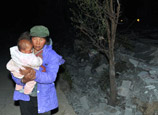
The war against wildlife trafficking cannot rely on any single country; it needs strong international cooperation.
That's according to one of China's leading specialists in wildlife protection, who said the illegal trade in wildlife is now a "transnational crime" and only the joint efforts of "origin, transit, and destination countries" will result in effective control.
Wan Ziming, director of law enforcement and training in China for the Convention on International Trade in Endangered Species of Wild Fauna and Flora, said the illegal trade in wildlife, as well as its parts and products, is estimated to be worth $7.8 billion to $10 billion per year.
The figures make wildlife trade the world's fourth-largest smuggling activity, after drugs, counterfeit goods and human trafficking.
He used elephant tusks as an example of how a wildlife crime chain might work, explaining the main problems often involve a lack of integrated data between countries affected by a chain, strict local law enforcement, and international coordination.
"There are often many countries involved in the whole process, from when an animal is first poached, to how it's transported, and where and how it is sold," he said.
"We cannot expect too much from any single country, especially if that country does not have sufficient law enforcement support."
Wan also compared the illegal trade in high-value wildlife parts, such as rhino horn, shatoosh (a shawl woven with the down hair of the Tibetan antelope) and ivory, to that of drugs in that both are intricate and require international cooperation to be effectively tackled.
Daniel M Ashe, director of the US Fish and Wildlife Service, told delegates at the 16th meeting of CITES member states, being held in Bangkok, Thailand, on Monday that there is a new generation of wildlife traffickers across the world, and law enforcement capacity should be stepped up through joint efforts by countries right along the chain.
A recent operation held in China illustrated just the kind of international cooperation that officials want to see.
The monthlong clampdown on wildlife crime, dubbed "Cobra", was held at the start of the year and brought together police, customs and wildlife officers from 22 countries in Asia, Africa, and North America.
 |
















 Missing baby killed in Changchun
Missing baby killed in Changchun


![]()
